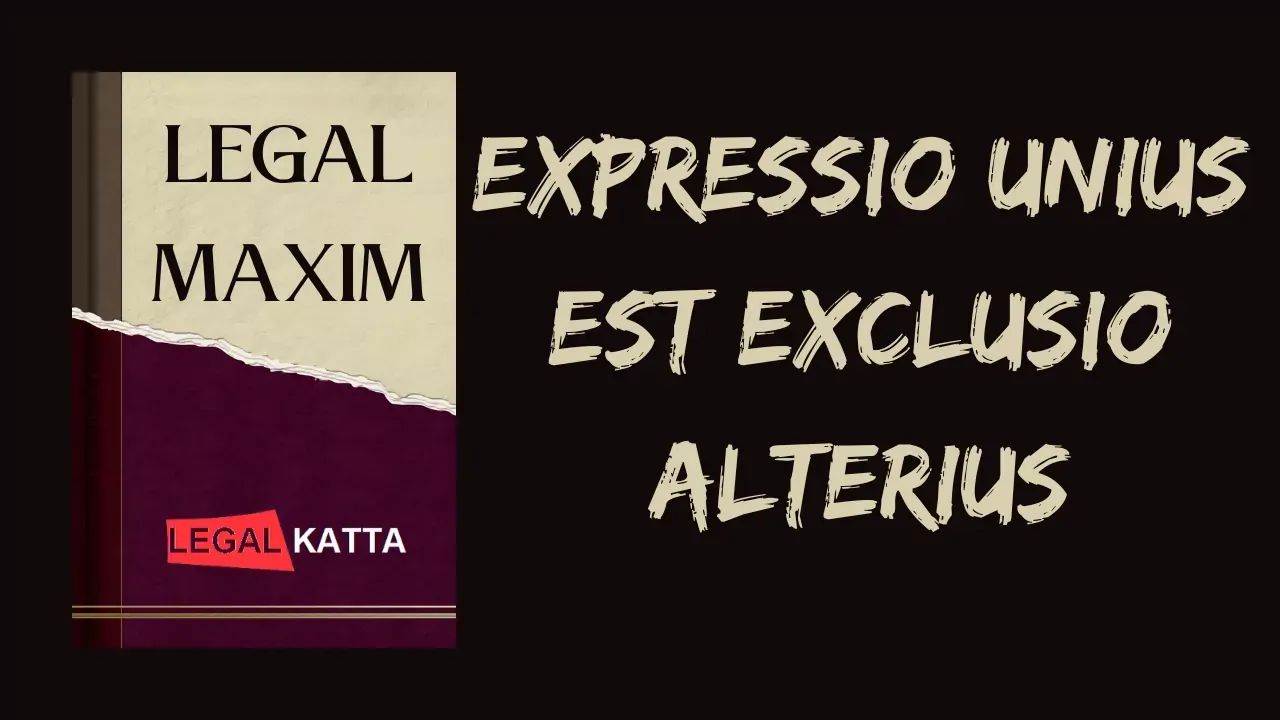Expressio Unius Est Eclusio Alterius is the Latin maxim which means, "the express mention of one person, thing, act or any consequence excludes the others."
This maxim is one of the rules used in the interpretation of statutes. The main purpose of this maxim is to ascertain the legislature's intent. This maxim is made applicable where the words of the statute are not clear or give several meanings then this maxim is applied.
Table of Contents
 |
| Expressio Unius Est Exclusio Alterius |
Expressio Unius Est Exclusio Alterius Meaning
Expressio Unius Est Exclusio Alterius meaning has been provided under the principles of statutory construction. Expressio Unius Est Exclusio Alterius means, "To express one is to exclude others." In other words, it means, "This maxim helps the interpreters to assertation the intent of the legislature. This maxim is applied when the words or phrases of any statute are not plain and clear and it is difficult to understand the meaning of those words or phrases."
The effect of this rule means that if the words are not followed by the general words in the sentence or paragraph the act only applies to the words used in the list. This is known as aid to the construction of statutes.
Read Also:
Expressio Unius Est Exclusio Alterius Example
Expressio Unius Est Exclusio Alterius example, it is an all-known fact that the weekend i.e. Saturday and Sunday are holidays, whereas, a company expressly provides that Sunday is a holiday and that impliedly means Saturday is a working day for the company.
If any statute refers to a particular group of people and then it only refers to that particular group of people and does not include any other groups of people.
Expressio Unius Est Exclusio Alterius Case Laws
Calcutta Tpt. Society vs State of Punjab, 1962
The court held that this rule may be applied only when the contrast between what is provided and what is left out leads to an inference that the latter war intended to be excluded. It may accordingly be held inapplicable if there exists a plausible reason for not mentioning what is left out.
R.V. Secretary of State for the Home Department, 1988 AC 958
In the R.V. Secretary of State for the Home Department case, it was held to exclude the father of an illegitimate child from rights under immigration law at the time, because the definition section specifically mentioned the mother alone.
Tempest v/s Kilner
In this case, the court had to rule whether the Statute of Fraud 1677 applied to the sale of stocks and shares. The Hon'ble court decided that stocks and shares were not covered by the act as the specific words, goods, wares and merchandise were not followed by the general words.
FAQs
What is the meaning of the Latin maxim Expressio Unius Est Exclusio Alterius?
The meaning of the legal maxim Expressio Unius Est Exclusio Alterius is 'the express mentioning of one thing, person, act or any consequence excludes the others.'
It is a maxim of the interpretation meaning that the expression of one thing is the exclusion of the other thing. When certain persons, things, or acts are specified in the law, an intention to exclude all others from its operation may be inferred.
Which principle is based on the maxim Expressio Unius Exclusio Alterius?
The Latin maxim Expressio Unius Exclusio Alterius is based upon the principle of statutory construction.
What is the importance of Expressio Unius Est Exclusio Alterius?
The maxim of expressio unius est exclusio is useful not only in determining the extent of contracts but also plays an important role in the construction of statutes.
Conclusion
Expressio Unius Est Exxlusio Alterius is the Latin maxim which means, "the express mention of one person, thing, act or any consequence excludes the others."
This maxim is one of the rules used in the interpretation of statutes. The main purpose of this maxim is to ascertain the legislature's intent. This maxim is made applicable where the words of the statute are not clear or give several meanings then this maxim is applied.
